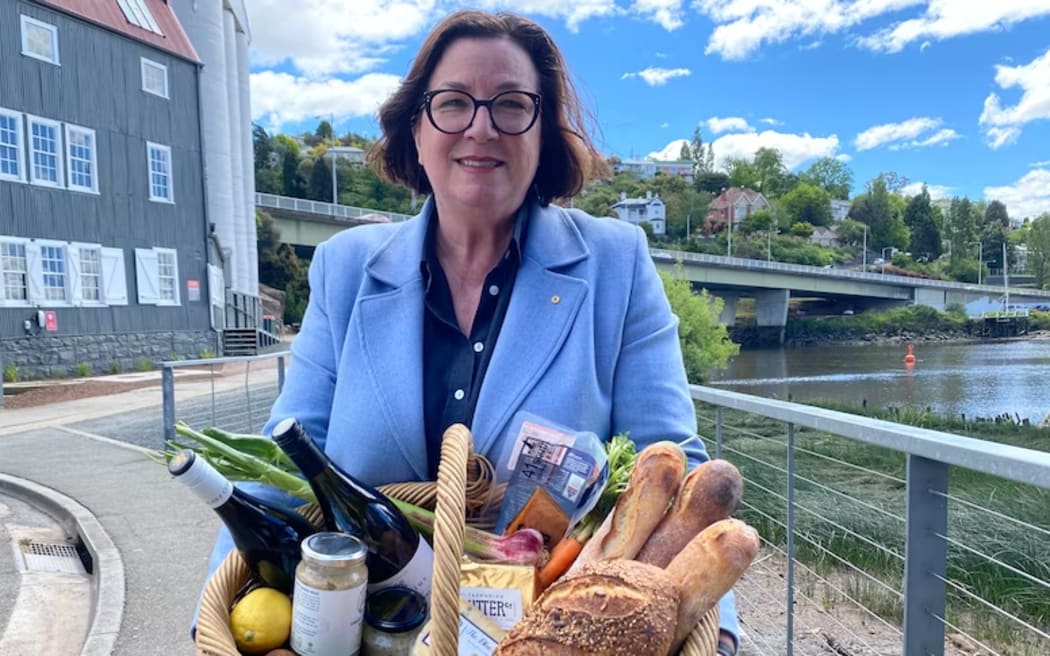"Delicious alchemy" is how Kim Seagram describes the process of transforming primary produce into something more nutritious and tasty via fermentation.
She's the chair of the Fermentation Hub - a world-first food facility in Tasmania due to be completed by the end of the year.

Photo: ABC News: Sean Wales
Fermentation is one of the oldest forms of food preservation and employed in products many of us consume every day - cheese (from milk), beer (from grains) and wine (from grapes).
After decades of working in the alcohol and restaurant industries, Seagram says fermentation has always been part of her life.
"My dill pickles and all of my preserves have been firmly a part of who I am and what I do here."
The Fermentation Hub - which Seagram describes as "a seven-year overnight success" - came about after many "scoping trips" to food incubators around the world.
She was it was apparent from the get-go that specialising in fermentation was what would make the facility truly unique.
New product development will be Hub's primary focus, and food entrepreneurs will "have their hands held" from concept through to market testing and, finally, commercial production.
Training in fermentation processes has been lacking in the food production industry, Seagram says.
"We're very good at growing some of the best stuff in the country but we're not very good at adding value to it.
"Training in winemaking is available but when you're talking all of the other fermented goodies, even in the dairy processing area, there really isn't a lot of training around and certainly no formal training - there's no formal training anywhere globally. So we'll be able to offer that in collaboration with the University of Tasmania and our local TAFE, as well."
The Hub will provide courses that are a kind of "technical tourism", Seagram says.
"Who doesn't like a really good makers workshop? All the way from making a fresh cheese in an afternoon or baking sourdough bread for a day to being able to be with one of our fabulous winemakers and joining them the entire journey through a vintage.
"[This is for] people in the industry who want to up their game, who want to add skills, be they a chef be they somebody in an associated fermentation industry who just wants to upgrade their skills ... you can come for the technical training that will give your career opportunities much more diversity and much more scope."
Winemakers, for example, are really busy for only three months of the year, she says.
"What do they do the rest of the year? Well, if they can be able to brew beer we'll be having some distilling courses as well. We'll be able to teach them how to bake bread and make cheese and things like that to just flesh out their career opportunities to give them a year-round career plan."
Fermentation is also an answer to food waste as you can "pickle the problem", Seagram says.
"There's a lot of vegetables and fruits that we grow that don't meet the specifications for the supermarkets. Rather than ploughing it back into the ground or feeding it to the cows, as much as the cows do like it, wouldn't it be fantastic if we could just take those out of spec and create the kimchis of the future?"
We've now gone from thinking of fermentation as "a pile of something rotting" to a pile of something that is going to be absolutely delicious, Seagram says.
Yet while Australia and New Zealand have incredibly rich food cultures, we don't do pickles quite as well as the rest of the world does.
"If you think from Japan right through Eastern Europe, pickles are just so much a part of their culture and a part of their diet - breakfast, lunch and dinner. If we can take some of that out-of-spec stuff and actually start creating a value-added product with it, I think that's a win-win for everybody."
For those interested in fermenting at home, Seagram recommends The Art of Fermentation by Sandor Katz.
"Just ease yourself into it gently and have an incredible amount of joy out of creating something to share with your friends and your family that you've made yourself.
"My dear friend gave me a spatula the other day they said 'Food makes love visible' and I truly believe in that."

